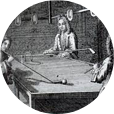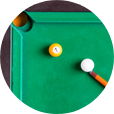Is Pool A Sport? Examining the Age-Old Debate

Welcome to the age-old debate: Is pool a sport or merely a game? This question has sparked countless discussions among enthusiasts and skeptics alike. At first glance, pool might seem like a casual pastime, a game of skill and strategy played in lounges and basements. But a closer look reveals layers of complexity that challenge this simplistic view. Does the strategic depth and talent required in pool qualify it as a sport, or does it remain in the realm of games? Let's explore this intriguing debate and examine the nuanced distinctions in the sport vs. game debate.
Tracing the Roots: Pool's Journey Through History
The history of pool, often intertwined with the question, "Is billiards a sport?," is as rich and varied as the game itself. Originating from a lawn game similar to croquet in the 15th century, pool evolved into the indoor version we know today. This transformation mirrors the sport's growing complexity and sophistication.
Let's take a closer look at the key developments that trace the evolution of pool from a leisurely pastime to a sport-like entity:
Medieval Europe
The roots of pool trace back to outdoor games played by the European gentry. Initially resembling croquet, it involved pushing balls through hoops using curved sticks, laying the foundation for modern pool.
16th Century
The game transformed dramatically when it moved indoors. The earliest pool tables surfaced in France and England, crafted with crude wooden planks for surfaces and simple wooden balls, marking a significant shift in the game's accessibility and popularity.
18th Century
The invention of the cue stick revolutionized the game. Replacing maces with cue sticks enabled more precision and skill, elevating pool from a mere leisure activity to a game requiring strategic thinking and dexterity.
20th Century
This era witnessed the emergence of professional players and major tournaments. Pool halls became common, and the game was increasingly recognized for its competitive nature, further kindling the debate, "Is pool considered a sport?"
1960s-70s
Pool's popularity surged in American culture, partly fueled by iconic films and the rise of charismatic champions. This era solidified pool's status in popular culture and as a competitive activity with sport-like qualities.
Modern Era
Today, pool boasts advanced equipment, including precision-engineered pool cues, and hosts international competitions. This evolution speaks volumes about its complexity and the skill required, aligning it more with sports than mere recreational games.
As pool transitioned from a casual activity to a competitive endeavor, it steadily amassed attributes typically associated with sports, fueling the "Is billiards a sport?" debate. Pool cues have come a long way. Today's sticks provide serious enthusiasts with the tools they need to maximize their billiards-playing skills.

Competing at the Table: Is Pool Considered a Sport?
In the context of the game's competitive scene, pondering, "Is pool considered a sport?" becomes inevitable. Here are a few compelling reasons in favor of pool's sports status:
Pool Tournaments
Much like other sports, pool tournaments are characterized by intense competition. These events bring together players with high levels of skill and dedication, showcasing pool as a serious competitive endeavor rather than just a recreational activity.
Skill, Strategy and Composure
Pool's requirement for strategic thinking, precise skill and mental composure under pressure mirrors expectations in athletic sports. These attributes elevate pool beyond a casual game, inching it closer to being recognized as a sport.
Global Popularity and Structure
Pool enjoys global popularity, with a well-organized competitive structure comprising leagues, professional circuits and international championships. This organized structure is a hallmark of traditional sports, bolstering the argument for pool's sport status.
Olympic Discussions
Although pool is not currently an Olympic sport, the ongoing discussions around "Is pool an Olympic sport?" highlight its potential for inclusion. The consideration for the Olympics indicates a growing recognition of the game's complexity and competitiveness on a global stage.
Sport vs. Game: Where Does Pool Stand?
The debate around "What is the difference between a game and a sport?" is pivotal in classifying pool. To understand this, let's examine the defining characteristics of the sport vs. game dynamic:
- Sports typically involve physical exertion, strategy and competitive play. Pool, while less physically demanding than some sports, requires strategic thinking and precision.
- The level of competition and skill in pool is comparable to many recognized sports.
- Pool's need for mental acuity and tactical play bridges the gap between game and sport.
The Skill and Strategy of Pool: A Mental and Physical Chess Game
The essence of pool's appeal extends beyond mere competition; it's in the intricate fusion of mental acuity and physical prowess. Let's delve into these aspects:
Hand-Eye Coordination and Control
Mastering pool demands exceptional hand-eye coordination. Players must execute precise shots, controlling the cue ball with delicate force and accuracy. This level of control is akin to what's required in precision sports, underscoring the physical skill element in pool.
Strategic Planning and Table Reading
Success in pool hinges on strategizing and reading the table effectively. Players must anticipate the outcomes of their shots, plan several moves ahead and adapt to changing scenarios, much like in a game of chess. This strategic depth adds a significant mental aspect to pool, elevating it beyond a simple game of chance.
Rigorous Training
Like traditional sports athletes, pool players often engage in rigorous mental and physical training. This training includes practicing shot techniques, enhancing concentration and maintaining physical fitness, further aligning pool with the characteristics of conventional sports.
Enhancing Skills with Accessories
Pool enthusiasts use pool and billiard training aids to improve accuracy, shot precision and overall game strategy – much like training equipment is used in other sports.
These elements collectively reinforce the argument that pool is not just a leisurely pastime but a demanding sport that requires both physical skill and mental acumen.
Frequently Asked Questions About Pool as a Sport
In addition to "Is pool a sport," there are other questions that billiards enthusiasts have regarding this topic. We've addressed a few of these below:
Can Playing Pool Improve Mental Skills?
Yes, there are several mental benefits of playing pool. The game enhances strategic thinking, concentration and problem-solving skills.
What Equipment Is Needed to Play Pool Competitively?
Competitive pool requires a high-quality cue, balls and a well-maintained table. If you're planning to square off against other skilled billiards players, ensuring you have the best possible billiards cues and pool cue accessories is a wise move.
Is Pool an Olympic Sport – Has it Ever Been Part of the Olympics?
To date, billiards has never been an Olympic sport. But its global popularity and competitive structure make it a potential candidate. There's plenty of support worldwide for pool to be added to the Olympics, so stay tuned!
Is Pool a Sport? We Know 'Tis & We Have the Tools to Prove It
The debate on "Is pool a sport" reveals a game rich in history, skill and strategic depth. FCI Billiards invites you to explore this fascinating world using the best tools of trade. You can learn more about the game's intricacies and strategies on our blog. Browse our collection of high-quality pool sticks designed for players of all levels. Then, join the pool community and experience the thrill of this timeless sport!
Why Pool is Such a Great Sport - Straight Pool Podcast
Mike Sigel, Kim Davenport and Reed Pierce join The Commish for a roundtable discussion, sharing their insights on why they believe pool is such an outstanding game.
Related Articles
 What Does Chalk Do in Pool? Understanding the Magic of Chalk and Getting the Perfect Cue Tip Grip
What Does Chalk Do in Pool? Understanding the Magic of Chalk and Getting the Perfect Cue Tip Grip
Discover what pool chalk does, how to use pool chalk for the perfect cue tip grip, and where to buy the best pool chalk to improve your game.
 The Parts of a Pool Cue
The Parts of a Pool Cue
Learn about the pool cue parts and the anatomy of a pool cue that can give you an edge in the game.
 Bet You Don't Know the Many Health Benefits of Playing Pool
Bet You Don't Know the Many Health Benefits of Playing Pool
Explore the multitude of health benefits, both physical and cognitive, that come from playing pool.
Recent Posts
-
January 22, 2025 By FCI Billiards When your game has progressed beyond the basics, it may be ti …Jan 22nd 2025
-
December 6, 2024 By FCI Billiards …Dec 6th 2024
-
July 29 2025 By FCI Billiards Taking on a new sport can be a little intimidating, particularly if …Nov 5th 2024










